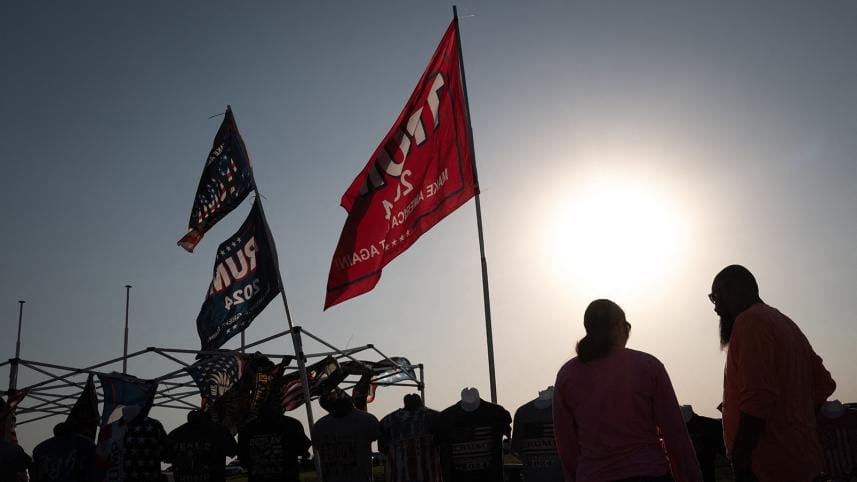Guns, transgender rights on docket for US Supreme Court fall term

The US Supreme Court returns from its summer recess on Monday with regulation of "ghost guns" -- firearms made from kits -- and medical care for transgender youth on a docket that risks being gate-crashed in the event of a contested presidential election.
David Cole, the legal director of the American Civil Liberties Union (ACLU), which frequently brings cases before the highest court, said he expects "a much quieter term than we've had in the last couple of years."
"But you know, that could change if the presidential election is close and disputed," Cole added in a reference to potential lawsuits stemming from the November 5 White House contest between Republican Donald Trump and Democrat Kamala Harris.
In a landmark decision last term in a case filed by Trump, who is charged with conspiring to overturn the results of the 2020 election, the conservative-dominated court ruled 6-3 that a former president has broad immunity from criminal prosecution.
The justices also dismissed a Colorado court ruling that would have barred Trump from the November ballot because of his role in the January 6, 2021 assault on the US Capitol by his supporters.
One of the first cases the justices will hear -- on Tuesday -- involves ghost guns: firearms sold online or in stores as "buy build shoot" kits that can be easily assembled at home.
The court will hear a challenge from gun manufacturers and owners to a rule from the federal Bureau of Alcohol, Tobacco, Firearms and Explosives (ATF) that requires ghost guns, like other firearms, to have serial numbers and for their purchasers to undergo background checks.
According to ATF figures, some 20,000 ghost guns were recovered at crime scenes in the United States in 2021, a tenfold increase from 2016.
Another high-profile case, described by Chase Strangio, an ACLU attorney, as one of the "most significant LGBTQ cases" to ever reach the Supreme Court, involves the deeply divisive issue of gender-affirming care for transgender youth.
The Justice Department is challenging a Tennessee ban on treatments for transgender minors such as puberty blockers or hormone therapy. Tennessee is one of two dozen Republican-led states enforcing such restrictions.
In April, the court allowed a similar ban -- in Idaho -- to take effect while legal challenges proceed. Under the Idaho law, medical professionals who provide treatments to minors can face up to 10 years in prison.
Ethics, low approval, reform
The Supreme Court will also hear a challenge to a law in Texas that requires pornographic websites to verify the age of visitors in order to limit minors' access to online sexual content.
The law mandating the sites to require state-issued identification from users has been challenged by a trade association representing the adult entertainment industry on the grounds it violates the free speech rights guaranteed by the First Amendment to the US Constitution.
The Supreme Court has also agreed to decide whether a $10 billion lawsuit filed by Mexico, accusing American gunmakers of fueling drug trafficking and violence, can go ahead.
Smith & Wesson and gun distributor Interstate Arms are seeking a dismissal of the Mexican government's suit, which has been winding its way through US courts since 2021.
The politically charged rulings, ethics scandals and the decision two years ago striking down the nationwide right to abortion have contributed to near record-low approval ratings for the Supreme Court, particularly among Democrats.
Fifty-two percent of the Americans surveyed in a Gallup poll in July said they disapprove of the way the court is handling its job, while 43 percent said they approve. Sixty-six percent of Republicans said they approve, but only 15 percent of Democrats.
The Supreme Court adopted an ethics code last year following reports of luxury vacations received by conservative justices Clarence Thomas and Samuel Alito -- both of whom have denied any impropriety -- but it was criticized for lacking an enforcement mechanism.
Thomas and Alito also both rebuffed calls to recuse themselves from cases related to the 2020 election -- Thomas because his wife supported Trump's efforts to overturn the results and Alito because flags linked to Trump's false election claims were flown outside his home.
Three of the nine justices on the top court -- Neil Gorsuch, Brett Kavanaugh and Amy Coney Barrett -- were nominated by Trump, giving conservatives a 6-3 majority on the bench.
Democratic President Joe Biden proposed reforms of the nation's highest court in July -- including limiting a justice's current lifetime appointment to an 18-year term -- but there is little to no chance of passage in a deeply divided Congress.



 For all latest news, follow The Daily Star's Google News channel.
For all latest news, follow The Daily Star's Google News channel.
Comments